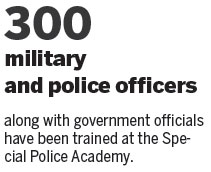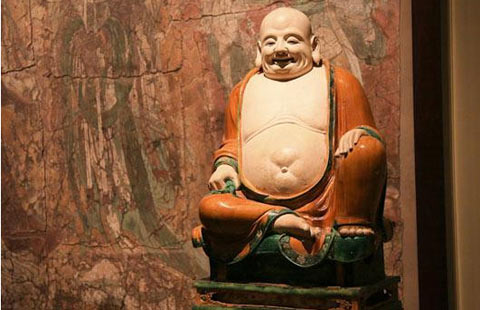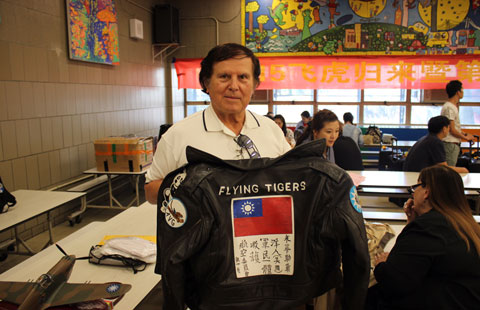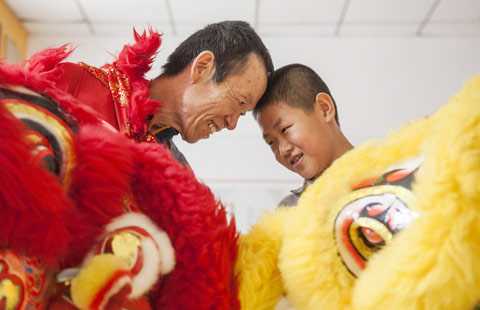Academy helps bolster overseas terrorism fight
Updated: 2015-08-04 07:41
By Zhao Lei(China Daily)
|
||||||||
Beijing training program assists foreign officers
When Lakhdar Idriss Mounir Lallali read The Art of War many years ago in his home country of Algeria, he never thought he would read it again in Beijing, in Chinese calligraphy.
The Art of War, written by Chinese military strategist Sun Tzu, is the world's oldest and possibly best-known military treatise. The book was completed during the late 6th century BC.
"I have deepened my understanding of the book during my visit here. Even though the tactics in it were thought out thousands of years ago, some of them can be applied to today's military affairs," Lallali said.
He is attending lectures on the book and other tactical expertise at the Special Police Academy of the Chinese People's Armed Police Force in Beijing.
As head of the Alert and Prevention Unit at the African Center for the Study and Research on Terrorism, Lallali arrived at the academy in late May to take part in an anti-hijacking training workshop with 50 participants from 23 developing countries, mostly African nations.
The training program, financed by the Ministry of Commerce, forms part of the framework under which China provides help to developing countries on technical cooperation and collaboration on human resources development.
The program aims to offer technical and intelligence expertise to anti-terrorism officers to enable them to better perform anti-hijacking operations, according to trainers at the Special Police Academy.
As the only such police academy in China, the institution began offering tailor-made courses to foreign officers in 2012. Since then, it has trained more than 300 military and police officers as well as government officials from more than 60 countries.
Bo Baoguang, vice-president of the academy, said members of the training staff are recruited from veteran Armed Police Force officers with years of experience in anti-terrorism operations and research.
"They provide the best training that we can offer," Bo said.
Some of the veteran officers are also trainers from the Falcon Commando Unit, an elite counterterrorism team under the Armed Police Force.
Chinese experience
Many of the countries taking part in the program, including Algeria, face serious threats from terrorism organizations on a daily basis, according to Lallali.
He said "well-equipped terrorists and their well-conceived schemes" pose great challenges to local police forces that lack counterterrorism knowledge and skills.
Lallali said he expects to gain experience from the commando unit, adding, "I will pay special attention to the strategies adopted in anti-terror exercises."
Professors at the academy have carefully selected topics they consider will help the overseas officers. These include anti-terror planning and hostage rescue strategies, with the professors seeking the most efficient teaching methods to meet participants' needs.
The courses, which center on one topic each day, consist of lectures and question-and-answer sessions.
Li Xiangsheng, who has taught anti-terrorism skills for more than 20 years at the academy, said, "Coupled with case studies, we hope to get down to the theoretical fundamentals and help them to analyze what will work and what will not."
As the training nears completion, Lallali said he and other participants have acquired some insight into how Chinese officers make quick judgments to respond to terror threats.
In one lecture that focused on the tactics needed to counter kidnappings in high-rises, the participants were deeply impressed by Li's analysis of possible hidden threats.
Sufian Ramli, a police colonel from Sudan, said, "Li provided a clear picture of the strategies, greatly enhancing our knowledge base.
"I was impressed by the fact that he sometimes referred to Chinese idioms from The Art of War that sounded interesting, but were hard to pronounce."
Mutual learning
Although members of the teaching staff are tasked with helping participants to become more effective in their own countries, they also found that the courses were rewarding. During one question-and-answer session, Lallali spent 20 minutes outlining strategies adopted by police in his home country.

Using pictures he took at the scene of one incident, he was able to provide the latest information on efforts in Africa to combat terrorism.
Although it had not been scheduled, his presentation was welcomed by Li, who described it as being detailed and informative, adding that he expects to hear more from course participants.
"It has become a mutual learning platform for us all," Li said. "Although it seems that some countries still lack equipment and tactics, their experiences and various types of threat they have encountered provide valuable lessons we can learn from.
"Considering the sophisticated and evolving challenges that we may face in the future, it is essential to know what needs to be improved through learning from each other, and this is one aspect of how an open discussion can push cooperation forward. We are looking forward to holding more in-depth exchanges."
Wang Yanfei contributed to this story.
zhaolei@chinadaily.com.cn

 Tsingtao gets ready for huge beer festival in China
Tsingtao gets ready for huge beer festival in China
 Stunning Shu brocade and embroidery techniques
Stunning Shu brocade and embroidery techniques
 Kazan games: Diving in the sky
Kazan games: Diving in the sky
 Torrential rain wreaks havoc in Jinan
Torrential rain wreaks havoc in Jinan
 A glimpse of Chinese cultural relics in foreign museums
A glimpse of Chinese cultural relics in foreign museums
 Flying Tigers show in New York
Flying Tigers show in New York
 Kobe Bryant frenzy grips Guangzhou
Kobe Bryant frenzy grips Guangzhou
 Three generations keep traditional lion dance alive
Three generations keep traditional lion dance alive
Most Viewed
Editor's Picks

|

|

|

|

|

|
Today's Top News
Obama issues challenge on climate change
GOPs begin pivotal debate week
Negotiation seen as key to China, US cyber solution
Beijing plans 'Silicon Valley' park for traditional culture
Obama issues challenge on climate change with power plant rule
China role crucial in UN plan
Biden associates resume discussion about presidential run
Malaysia seeks help to widen search for MH370
US Weekly

|

|







